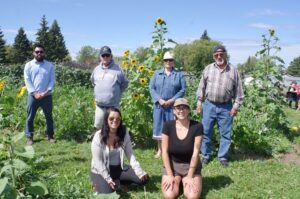Indigenous Food Circle kicks off workshops to guide back to food sovereignty and self-determined food systems

By Rick Garrick
THUNDER BAY — The Indigenous Food Circle kicked off a series of Understanding Our Food Systems workshops across the Northern Superior Region area with an Aug. 18 workshop on using fish to improve garden soils. The Indigenous Food Circle works with 14 First Nations in the area, including Fort William, Red Rock Indian Band, Biinjitiwaabik Zaaging Anishinaabek, Long Lake #58, Pays Plat, Biigtigong Nishnaabeg and Netmizaaggamig Nishnaabeg.
“We were doing fish emulsion, which is a fertilizer — but we did it in a more cultural way,” says Jessica McLaughlin, coordinator of the Indigenous Food Circle and Long Lake #58 citizen. “We talked to Elders about what happened hundreds of years ago when they were trying to raise nitrogen and calcium levels in the soil, so one of the ancient techniques is fish emulsion. It’s burying fish guts or full fish in the ground with some compostable stuff.”
McLaughlin says the youth participants dug the holes for the fish emulsion during the workshop, which was held at the Roots to Harvest Urban Farm in Thunder Bay.
“In two years, Roots to Harvest will have a really beautiful garden with the nitrogen and calcium the fish will add to the soil,” McLaughlin says, noting that Elder Gerry Martin spoke about how fish was buried at different times of the year. “So it would do different things for the soil at that time.”
McLaughlin says the Indigenous Food Circle had been planning to hold a large gathering at Red Rock Indian Band’s Chalet Lodge in mid-August but opted to hold small regional gatherings due to the coronavirus disease 2019 (COVID-19) pandemic.
“All the community members would have been [attending] that we work with in the communities,” McLaughlin says. “Those 14 communities have been working on food sovereignty visions for the last three years so we’ve been helping support them in that work through funding, through connection, through networks.”
McLaughlin says Winona LaDuke, an Indigenous environmentalist, economist and writer from the United States, is scheduled to speak at an online event in September.
“We’re going to make that one live because we want to share what Winona is going to say,” McLaughlin says. “Also, we’re going to get some of the communities to talk about their projects.”
Shelby Gagnon, project coordinator for Understanding Our Food Systems, a project partnership between the Indigenous Food Circle and Thunder Bay District Health Unit (TBDHU), says blueberries and preserving will be subject of the next workshop on Aug. 25 at Roots to Harvest in Thunder Bay.
“It’s just talking about food sovereignty and what it is and how can we see that in our communities,” Gagnon says. “Our next gathering will be in Whitesand where we’re going to be harvesting veggies and washing and [showing] how to prepare them. [The] next gatherings will be in October — we’re going to have two trapping workshops, one in Aroland and one in Red Rock Indian Band, as well as a pemmican making workshop at Roots to Harvest.”
Ivan Ho, public health nutritionist with TBDHU, says TBDHU is trying to reach out more to Indigenous communities.
“What we’re trying to do as a health unit is reaching out to see where we can support and help them kind of guide their own way back to that food sovereignty and self-determined food systems,” Ho says. “[The fish emulsion workshop] was extremely interesting — personally I’ve never seen it before. It was an opportunity to showcase what was done in the past and perhaps moving forward how can we return some aspect of food sovereignty back to those communities.”


